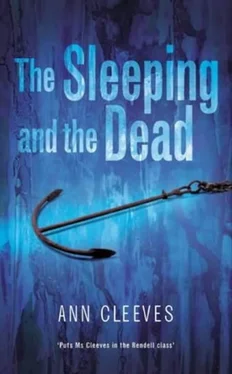Later he, Stout and Carver sat in the Range Rover to compare notes. Carver had with him a silver thermos flask of coffee which he passed around, wiping the cup each time with a paper handkerchief, like a priest at communion.
‘Really,’ he said in the prissy voice which made some of Porteous’s colleagues want to thump him. ‘It’s most interesting. I’ve read about it of course, but this is the first time I’ve seen it.’
‘Seen what?’ Porteous had come across Carver when he was working in the city and was prepared to be patient with him. The man was a good pathologist and he could usually be persuaded to commit himself. Porteous would put up with a lot for that.
‘Adipocere. That’s what it’s called. It’s caused by saponification. Literally the making of soap. The effect of water on the body fat. One of the first pathologists to describe it said it’s as if the corpse is encased in mutton suet. Remarkably apt as I’m sure you’ll agree. Sometimes the adipocere preserves the internal organs. I won’t be able to tell you that, of course, until the post-mortem. I’ll do that as soon as I can. This afternoon if it can be arranged. I wouldn’t be surprised if some of my colleagues didn’t want to be present.’ He took a fastidious sip of his coffee. ‘Really, I can hardly wait.’
Porteous lived in a barn as big as a church, which had been converted into three flats. He had the top floor to himself. Exposed rafters stretched to a sloping roof. There were two long windows, a view over farmland. Occasionally, if the light was right, he could see the glint of the lake in the distance, like a child’s imagined glimpse of the sea. One wall was exposed stone, the others plastered and whitewashed. On these he hung the paintings he collected. He always went to the fine-art students’ finals exhibition at the university in the city. Usually he saw something he liked.
It was early evening. Porteous didn’t believe in unnecessary overtime. It messed up his budgets, and tasks which could normally be fitted into the working day expanded, became more complicated, to fit the time allowed. Tonight, despite the body in the lake, he sent his team home at the usual time. There was nothing they could do until they had identification. Besides, he wanted them calm and reasonable in the morning. He hated the frantic, febrile atmosphere which sometimes enveloped a murder case. Rational judgement was lost. It was as if there was something heroic about the obsession with one victim, one perpetrator, about the lack of sleep, the passion stoked by alcohol. He had, however, brought work home with him. He had carried six large box files up the open stairs. They contained the flimsy copies of missing-person reports between 1968 and 1985. The last five of the years which were of interest to him, 1986-1990, had been computerized, and he would check those in the morning.
He had attended Carver’s post-mortem. As the pathologist had suggested, there was quite an audience. The little man had played up to them, preening himself, throwing out scientific jokes and puns which meant little to Porteous but raised a titter amongst his colleagues.
Porteous had taken notes in impeccable shorthand, following Carver’s commentary exactly. The pathologist had performed like a music-hall magician, and there was likely to be as much information in the suggestion, the conjecture, the surprise discovery as in the completed official report. Porteous set his notes on the painted table which stood under one of the windows and went to the tiny kitchen to make a pot of tea. He liked Earl Grey, weak with a slice of lemon. He poured a dribble, was satisfied that it was ready and filled the cup. Then he returned to his notes and translated them in his head.
Carver had confirmed that the body had been in the water for at least ten years. The victim was a young male, aged between sixteen and twenty-five. He was five feet ten inches tall and, despite the adipocere, which usually occurred only when the victim had considerable body fat, he was of slender build. Carver had been excited by that fact, had thought it might warrant a note in a scientific journal. Enough of the organs, protected by the hard white layer of adipocere, remained for Carver to give a cause of death. The young man had been stabbed. By a knife with a short but unusually wide blade. A dagger of some sort. He had been stabbed in the back. A sharp upward movement into the heart. Either the perpetrator had known what he was doing or he had been very lucky. At this Carver had looked at his friends and grinned.
‘Very exotic, gentlemen, very theatrical, as I’m sure you’ll agree, for our small town in the hills.’
The body had been tied to the anchor by a piece of nylon rope, which had been looped around the waist. The young man had been clothed, though most of the garments had rotted and only tatters remained. The scraps had been retained and the forensic team was examining them. He had been wearing boots made of a soft leather or suede. Around his wrist was a plaited leather bracelet, which looked home-made. Perhaps from a bootlace.
At this Porteous stopped for a moment and took a sip of tea. He had been a child in the seventies. His only brother had been ten years older, and Porteous pictured him preparing to go out for the night. He saw him quite clearly, standing in front of the mirror in his parents’ room, the only long mirror in the house. He was wearing wide trousers, desert boots, a fringed suede jacket. Around his neck was a leather thong threaded with wooden beads. The victim’s bracelet suggested to Porteous the fashion of the seventies. The end of flower power. Not punk or the new romantics. He made a note and continued.
There had been some dental work. Carver announced this as if they should be grateful to him. Which Porteous certainly was. After all this time it held the best chance of positive identification. There had not been extensive work on the teeth – one extraction and two small fillings – but a record of the mouth, perhaps even an X-ray would have been taken. There was no guarantee that the dentist was still in business or that the records had been kept but at least it provided an avenue of investigation. Porteous thought it would give his team something to do the following day. He liked to keep them busy.
He leant back in his chair and emptied the pot into his wide blue cup – part of the tea service which had been a present to himself when he moved into the barn. He stretched with satisfaction. This was why he had joined the police. Not to save the world. Not to race around the countryside in fast cars or strut the city streets in a uniform. But to bring order, to solve problems, to understand.
He set the post-mortem notes to one side and pulled the first box file towards him, savouring a moment of anticipation before opening it. This was what he loved, this precise and meticulous sorting of facts. He had never understood why his colleagues thought such work tedious.
Each report was a minor human tragedy, baldly told, given a dignity because the facts were unembellished. He sorted them first into gender and age, rejecting the menopausal women with depression, the elderly wanderers from care homes, the occasional heart-breaking ten-year-old who had gone to a friend’s house to play and never returned. Still he was left with a mountain of paper. The majority of missing-person reports was for young males. They’d left home after problems at school, a row with parents, or in search of a more exciting life. He knew that many would have returned or got in touch. The relatives, simply relieved that the panic was over, would never have thought to inform the police.
He became engrossed in the task and couldn’t let it go. He had planned just to sort through the paperwork but began phoning the contact numbers for relatives. Inevitably some had moved or died, but Cranford was the sort of town where people knew one another. Other phone numbers were given, alternative names suggested. The people wanted to talk. Porteous listened patiently to tales of lads who’d been scallies as youngsters but who’d gone on to do well for themselves, who’d taken university degrees, settled down, had families. The worst calls were when boys were still missing and no contact had ever been made. Porteous heard the flurry of hope in elderly voices.
Читать дальше












